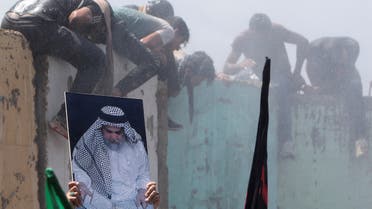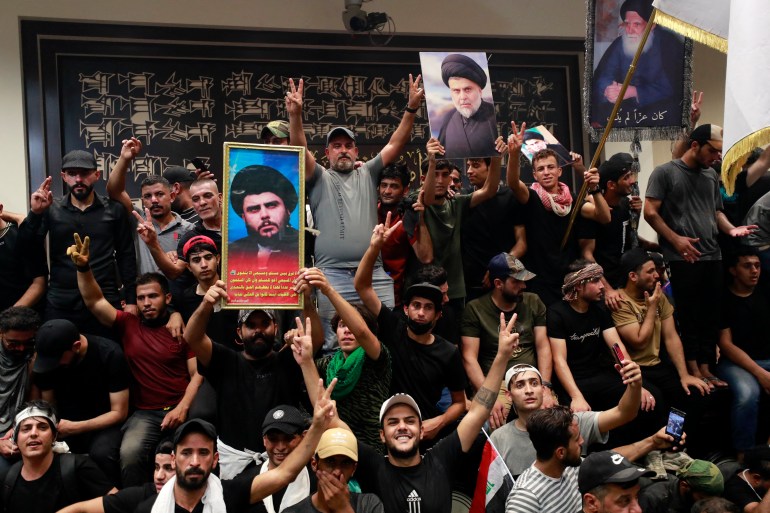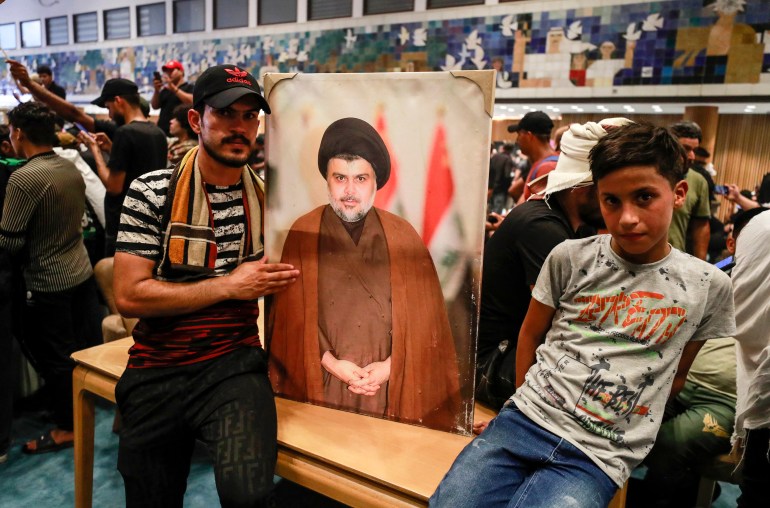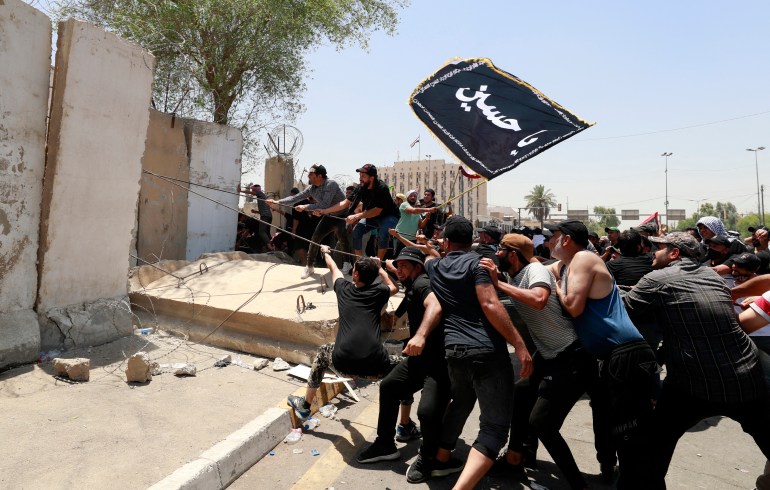AFP - 10h ago
Supporters of powerful Iraqi cleric Moqtada Sadr penetrated Baghdad's heavily fortified Green Zone on Saturday, occupying parliament with no plan to leave.

© Ahmad Al-RubayeSadr supporters tear down a concrete barrier before breaching the Green Zone

© Ayman HENNASupporters of powerful Iraqi Shiite cleric Moqtada Sadr gather at the end of a bridge leading to Baghdad's heavily fortified "Green Zone" district of government buildings and foreign embassies.
In a deepening political crisis, it is the second time in days that Sadr supporters have forced their way in to the legislative chamber, months after elections that failed to lead to formation of a government.

© Ahmad Al-RubayeA man displays an Iraqi flag while supporters of the cleric Moqtada Sadr occupy the country's parliament
"The demonstrators announce a sit-in until further notice," Sadr's movement said in a brief statement to journalists carried by state news agency INA.
Supporters of Sadr, who once led a militia against US and Iraqi government forces, oppose the recently announced candidacy of Mohammed Shia al-Sudani, a pro-Iran bloc's pick for prime minister.
"We don't want Mr Sudani," said one protester, Sattar al-Aliawi, 47, in the parliamentary gardens.
The civil servant said they were protesting "a corrupt and incapable government" and would "sleep here".
He added: "The people totally refuse the parties that have governed the country for 18 years," since a US-led invasion toppled dictator Saddam Hussein.
Demonstrators inside the legislature waved Iraqi flags and pictures of the cleric.
They crowded the chamber where some sat at lawmakers' desks while others milled about, raising their mobile phones to film the occupation.

© Ahmad Al-RubayeIt is the second parliamentary occupation in three days
- 'The people are with you' -
They entered after thousands of protesters had massed at the end of a bridge leading to the Green Zone before dozens pulled down concrete barriers protecting it and ran inside, an AFP photographer reported.

© Ahmad Al-RubayeSupporters of Iraqi cleric Moqtada Sadr rest beside his picture after occupying parliament, where they vow to remain
Security forces had fired tear gas and water cannon near an entrance to the district, also home to foreign embassies and other government buildings.

© Ahmad Al-rubayeA Sadr supporter stands atop one of the watchtowers at Iraq's parliament
Some protesters on the bridge were injured and carried off by their fellow demonstrators.
The health ministry said at least 100 protesters and 25 members of the security forces had been hurt.
"All the people are with you Sayyed Moqtada," the protesters chanted, using his title as a descendant of the Prophet Mohammed.
Sadr's bloc emerged from elections in October as the biggest parliamentary faction, but was still far short of a majority.
The mercurial Sadr, long a player in the country's politics, has a devoted following of millions among the country's majority Shiite population.
Supporters of Iraqi cleric Moqtada Sadr bring down concrete barriers leading to the "Green Zone"
His supporters oppose the candidacy of Sudani, the pro-Iran Coordination Framework's pick for premier.
The protests are the latest challenge for a country trying to overcome decades of war.
Despite oil wealth and elevated global crude prices, Iraq remains hobbled by corruption, unemployment and other problems which sparked a youth-led protest movement in 2019.
- 'Revolution' -
Saturday's demonstration came after crowds of Sadr supporters breached the Green Zone on Wednesday. They left two hours later after Sadr told them to.
After the latest occupation began, the Coordination Framework called on "the popular masses... to peacefully demonstrate in defence of the state and its legitimacy."
The United Nations Assistance Mission for Iraq said the "ongoing escalation" was deeply concerning.
"Voices of reason and wisdom are critical to prevent further violence," it said in a tweet.
The current Prime Minister Mustafa al-Kadhemi in a statement expressed regret that "political escalation increases tensions in the street."
"We are here for a revolution," said one protester, Haydar al-Lami.
In June, Sadr's 73 lawmakers quit their seats in a move seen as seeking to pressure his rivals into fast-tracking the formation of a government.
Sixty-four new lawmakers were sworn in later that month, making the pro-Iran bloc the largest in parliament, and triggering the fury of Sadr's supporters.
"We would have liked them to wait until the government was formed to evaluate its performance, to give it a chance and to challenge it if it is not," said Ammar al-Hakim, whose Hima movement is part of the Coordination Framework.
"The Sadrist movement has a problem with the idea that the Coordination Framework will form a government," he said in a recent interview with BBC Arabic.
Sadr supporters hold new protest in Iraqi capital

Supporters of Iraqi Shi'ite cleric Moqtada al-Sadr protest against corruption,

Supporters of Iraqi Shi'ite cleric Moqtada al-Sadr protest against corruption,
in Baghdad, Iraq July 30, 2022. (File photo: Reuters)
AFP, Baghdad
Published: 30 July ,2022:
Thousands of supporters of influential Iraqi cleric Muqtada al-Sadr protested Saturday in a new show of strength three days after storming parliament in a country mired in crises.
Brandishing Iraqi flags and portraits of Sadr, the protesters gathered at the end of a bridge leading to Baghdad's heavily fortified “Green Zone” district of government buildings and foreign embassies, an AFP correspondent reported.
For all the latest headlines follow our Google News channel online or via the app.
“All the people are with you Sayyed Muqtada,” the protesters chanted, using his title as a descendant of the prophet, while some of them climbed onto a concrete barrier.
Sadr's bloc emerged from elections in October as the biggest parliamentary faction, but was still far short of a majority and, 10 months on, deadlock persists over the establishment of a new government.
Supporters of the Shia cleric oppose the recently announced candidacy of Mohammed al-Sudani, a former minister and ex-provincial governor, who is the pro-Iran Coordination Framework's pick for premier.
The protests are the latest challenge for oil-rich Iraq, which remains mired in a political and a socioeconomic crisis despite elevated global crude prices.
Crowds of Sadr supporters on Wednesday breached the Green Zone despite volleys of tear gas fire from the police.
They occupied the parliament building, singing, dancing and taking selfies before leaving two hours later but only after Sadr told them to leave.
On Saturday, security forces shut off roads in the capital leading to the Green Zone with massive blocks of concrete.
“We are here for a revolution,” said protester Haydar al-Lami.
“We don't want the corrupt; we don't want those who have been in power to return... since 2003... they have only brought us harm.”
By convention, the post of prime minister goes to a leader from Iraq's Shia majority.
Sadr, a former militia leader, had initially supported the idea of a “majority government.”
That would have sent his Shia adversaries from the pro-Iran Coordination Framework into opposition.
The Coordination Framework draws lawmakers from former prime minister Nuri al-Maliki's party and the pro-Iran Fatah Alliance, the political arm of the Shia-led former paramilitary group Hashed al-Shaabi.
But last month Sadr's 73 lawmakers quit in a move seen as seeking to pressure his rivals to fast-track the establishment of a government.
Sixty-four new lawmakers were sworn in later in June, making the pro-Iran bloc the largest in parliament.
Read more:
Protesters leave after storming Iraqi parliament
Riot police repel protesters at Baghdad's Green Zone
AFP, Baghdad
Published: 30 July ,2022:
Thousands of supporters of influential Iraqi cleric Muqtada al-Sadr protested Saturday in a new show of strength three days after storming parliament in a country mired in crises.
Brandishing Iraqi flags and portraits of Sadr, the protesters gathered at the end of a bridge leading to Baghdad's heavily fortified “Green Zone” district of government buildings and foreign embassies, an AFP correspondent reported.
For all the latest headlines follow our Google News channel online or via the app.
“All the people are with you Sayyed Muqtada,” the protesters chanted, using his title as a descendant of the prophet, while some of them climbed onto a concrete barrier.
Sadr's bloc emerged from elections in October as the biggest parliamentary faction, but was still far short of a majority and, 10 months on, deadlock persists over the establishment of a new government.
Supporters of the Shia cleric oppose the recently announced candidacy of Mohammed al-Sudani, a former minister and ex-provincial governor, who is the pro-Iran Coordination Framework's pick for premier.
The protests are the latest challenge for oil-rich Iraq, which remains mired in a political and a socioeconomic crisis despite elevated global crude prices.
Crowds of Sadr supporters on Wednesday breached the Green Zone despite volleys of tear gas fire from the police.
They occupied the parliament building, singing, dancing and taking selfies before leaving two hours later but only after Sadr told them to leave.
On Saturday, security forces shut off roads in the capital leading to the Green Zone with massive blocks of concrete.
“We are here for a revolution,” said protester Haydar al-Lami.
“We don't want the corrupt; we don't want those who have been in power to return... since 2003... they have only brought us harm.”
By convention, the post of prime minister goes to a leader from Iraq's Shia majority.
Sadr, a former militia leader, had initially supported the idea of a “majority government.”
That would have sent his Shia adversaries from the pro-Iran Coordination Framework into opposition.
The Coordination Framework draws lawmakers from former prime minister Nuri al-Maliki's party and the pro-Iran Fatah Alliance, the political arm of the Shia-led former paramilitary group Hashed al-Shaabi.
But last month Sadr's 73 lawmakers quit in a move seen as seeking to pressure his rivals to fast-track the establishment of a government.
Sixty-four new lawmakers were sworn in later in June, making the pro-Iran bloc the largest in parliament.
Read more:
Protesters leave after storming Iraqi parliament
Riot police repel protesters at Baghdad's Green Zone
Iraqi protesters storm parliament for second time in a week
Supporters of Shia leader Muqtada al-Sadr occupy parliament to prevent the nomination of a new PM.
 Supporters of the Iraqi Shia leader al-Sadr raise portraits of their leader inside the country's parliament in the capital Baghdad's high-security Green Zone [Ahmad Al-Rubaye/AFP]
Supporters of the Iraqi Shia leader al-Sadr raise portraits of their leader inside the country's parliament in the capital Baghdad's high-security Green Zone [Ahmad Al-Rubaye/AFP]
Published On 30 Jul 2022
Protesters have once again breached Iraq’s parliament in a show of support for influential Shia leader Muqtada al-Sadr, leaving at least 125 people injured and escalating a political standoff.
Saturday’s demonstration comes days after protesters stormed the legislative body and suspended a session to nominate a new prime minister.
Thousands of supporters rallied by al-Sadr and his Sadrist Movement tore down concrete barriers on Saturday and entered the Green Zone, which houses government departments and foreign missions, before breaking into parliament.
The scenes followed similar protests on Wednesday, although this time at least 125 people – 100 civilians and 25 members of the security forces – were wounded, according to the Ministry of Health.
Al-Sadr’s supporters threw stones and police fired tear gas and stun grenades.
“We are calling for a government free from corruption … and those are the demands of the people,” one protester, Abu Foad, told the Reuters news agency among crowds of protesters carrying placards with al-Sadr’s photograph and national flags.
The media office of Prime Minister Mustafa al-Kadhimi had issued a statement calling on security officers to guarantee the safety of state institutions.

Zeidon Alkinani, an analyst with the Arab Center in Washington, told Al Jazeera that “we shouldn’t be surprised that al-Sadr’s supporters are able to enter government premises, in contrast to the protests that began in 2019”.
Political movements such as the Sadrist movement “have infiltrated the ministry of interior affairs and of defence, meaning that it is very easy for them to bypass any security checkpoints,” the analyst said.
“Another layer to this crisis is the personal rivalry between al-Maliki – who is the most influential politician in the Coordination Framework – and al-Sadr,” Alkinani said.
“This rivalry has been going on since 2006. It’s an ideological and military rivalry that has been affecting the daily life of ordinary Iraqis.”
SOURCE: AL JAZEERA AND NEWS AGENCIES
Supporters of Shia leader Muqtada al-Sadr occupy parliament to prevent the nomination of a new PM.
 Supporters of the Iraqi Shia leader al-Sadr raise portraits of their leader inside the country's parliament in the capital Baghdad's high-security Green Zone [Ahmad Al-Rubaye/AFP]
Supporters of the Iraqi Shia leader al-Sadr raise portraits of their leader inside the country's parliament in the capital Baghdad's high-security Green Zone [Ahmad Al-Rubaye/AFP]Published On 30 Jul 2022
Protesters have once again breached Iraq’s parliament in a show of support for influential Shia leader Muqtada al-Sadr, leaving at least 125 people injured and escalating a political standoff.
Saturday’s demonstration comes days after protesters stormed the legislative body and suspended a session to nominate a new prime minister.
Thousands of supporters rallied by al-Sadr and his Sadrist Movement tore down concrete barriers on Saturday and entered the Green Zone, which houses government departments and foreign missions, before breaking into parliament.
The scenes followed similar protests on Wednesday, although this time at least 125 people – 100 civilians and 25 members of the security forces – were wounded, according to the Ministry of Health.
Al-Sadr’s supporters threw stones and police fired tear gas and stun grenades.
“We are calling for a government free from corruption … and those are the demands of the people,” one protester, Abu Foad, told the Reuters news agency among crowds of protesters carrying placards with al-Sadr’s photograph and national flags.
The media office of Prime Minister Mustafa al-Kadhimi had issued a statement calling on security officers to guarantee the safety of state institutions.

Supporters of al-Sadr hold a picture of their leader inside the
country’s parliament [Ahmad Al-Rubaye/AFP]
Al Jazeera’s Mahmoud Abdelwahed, reporting from Baghdad, said that supports of al-Sadr “are now in full control of the headquarters of the parliament.
“What’s new this time is that they’re not planning to leave until, as they say, their demands are met,” Abdelwahed said.
Demonstrators oppose the candidacy of Mohammed Shia al-Sudani, a former minister and ex-provincial governor, who is the pro-Iran Coordination Framework’s pick for the premier’s post.
A vote on appointing al-Sudani to the post of prime minister was scheduled to take place on Saturday, but the session was suspended after Wednesday’s events.
“They do not want parliament to accept al-Sudani … they believe [he] is a replica of Nouri al-Maliki, the former prime minister, whom they accuse of corruption,” Abdelwahed said. “Many of them accuse him of ruining the country for two terms when he was prime minister.
“[Protesters] wanted to storm the headquarters of the Supreme Judiciary Council, but they were instructed by one of the aides of al-Sadr at the last moment to back off, to keep it peaceful and keep it quiet.
“Despite all of these calls from politicians to keep it peaceful, to refrain from violence, it has been very chaotic and disorganised … the situation remains very tense,” Abdelwahed said.
Political deadlock
Al-Sadr’s bloc emerged from elections in October as the biggest parliamentary faction but still fell far short of a majority.
Ten months on, the deadlock persists over the establishment of a new government – the longest period since the 2003 invasion by the United States reset the political order in the oil-rich country.
Squabbling political parties failed to reach the two-thirds majority needed to pick a president – an important step before a prime minister can be selected. By convention, the post of prime minister goes to a leader from Iraq’s Shia majority.
After the negotiations stalled, al-Sadr withdrew his bloc from parliament and announced he was exiting talks on forming a government.
Al-Sadr’s withdrawal ceded dozens of seats to the Coalition Framework, an alliance of Shia parties backed by Iran.
Al-Sadr has since made good on threats to stir up popular unrest if parliament tries to approve a government he does not like, saying it must be free of foreign influence – by Iran and the United States – and the corruption that has plagued Iraq for decades.
Al Jazeera’s Mahmoud Abdelwahed, reporting from Baghdad, said that supports of al-Sadr “are now in full control of the headquarters of the parliament.
“What’s new this time is that they’re not planning to leave until, as they say, their demands are met,” Abdelwahed said.
Demonstrators oppose the candidacy of Mohammed Shia al-Sudani, a former minister and ex-provincial governor, who is the pro-Iran Coordination Framework’s pick for the premier’s post.
A vote on appointing al-Sudani to the post of prime minister was scheduled to take place on Saturday, but the session was suspended after Wednesday’s events.
“They do not want parliament to accept al-Sudani … they believe [he] is a replica of Nouri al-Maliki, the former prime minister, whom they accuse of corruption,” Abdelwahed said. “Many of them accuse him of ruining the country for two terms when he was prime minister.
“[Protesters] wanted to storm the headquarters of the Supreme Judiciary Council, but they were instructed by one of the aides of al-Sadr at the last moment to back off, to keep it peaceful and keep it quiet.
“Despite all of these calls from politicians to keep it peaceful, to refrain from violence, it has been very chaotic and disorganised … the situation remains very tense,” Abdelwahed said.
Political deadlock
Al-Sadr’s bloc emerged from elections in October as the biggest parliamentary faction but still fell far short of a majority.
Ten months on, the deadlock persists over the establishment of a new government – the longest period since the 2003 invasion by the United States reset the political order in the oil-rich country.
Squabbling political parties failed to reach the two-thirds majority needed to pick a president – an important step before a prime minister can be selected. By convention, the post of prime minister goes to a leader from Iraq’s Shia majority.
After the negotiations stalled, al-Sadr withdrew his bloc from parliament and announced he was exiting talks on forming a government.
Al-Sadr’s withdrawal ceded dozens of seats to the Coalition Framework, an alliance of Shia parties backed by Iran.
Al-Sadr has since made good on threats to stir up popular unrest if parliament tries to approve a government he does not like, saying it must be free of foreign influence – by Iran and the United States – and the corruption that has plagued Iraq for decades.

Supporters of al-Sadr bring down concrete barriers leading to the capital Baghdad’s high-security Green Zone [Ahmad Al-Rubaye/AFP]
On Saturday, Al-Sadr’s supporters chanted against his rivals who are now trying to form a government. Many protested in front of the country’s Supreme Court, which al-Sadr has accused of meddling to prevent him from forming a government.
In response, the Coalition Framework called on Iraqis to protest peacefully “in defence of the state, its legitimacy and its institutions”, a statement read later on Saturday, raising fears of clashes.
The United Nations called for de-escalation. “Voices of reason and wisdom are critical to prevent further violence,” its mission in Iraq said.
Al-Sadr, whom opponents also have accused of corruption, maintains large state power himself because his movement remains involved in running the country. His loyalists sit in powerful positions throughout Iraqi ministries and state bodies.
Iraqis linked neither to al-Sadr nor to his opponents said they are caught in the middle of the political gridlock.
Mass mobilisation is a well-worn strategy of al-Sadr, a mercurial figure who has emerged as a powerful force with a nationalist, anti-Iran agenda.
On Saturday, Al-Sadr’s supporters chanted against his rivals who are now trying to form a government. Many protested in front of the country’s Supreme Court, which al-Sadr has accused of meddling to prevent him from forming a government.
In response, the Coalition Framework called on Iraqis to protest peacefully “in defence of the state, its legitimacy and its institutions”, a statement read later on Saturday, raising fears of clashes.
The United Nations called for de-escalation. “Voices of reason and wisdom are critical to prevent further violence,” its mission in Iraq said.
Al-Sadr, whom opponents also have accused of corruption, maintains large state power himself because his movement remains involved in running the country. His loyalists sit in powerful positions throughout Iraqi ministries and state bodies.
Iraqis linked neither to al-Sadr nor to his opponents said they are caught in the middle of the political gridlock.
Mass mobilisation is a well-worn strategy of al-Sadr, a mercurial figure who has emerged as a powerful force with a nationalist, anti-Iran agenda.
Zeidon Alkinani, an analyst with the Arab Center in Washington, told Al Jazeera that “we shouldn’t be surprised that al-Sadr’s supporters are able to enter government premises, in contrast to the protests that began in 2019”.
Political movements such as the Sadrist movement “have infiltrated the ministry of interior affairs and of defence, meaning that it is very easy for them to bypass any security checkpoints,” the analyst said.
“Another layer to this crisis is the personal rivalry between al-Maliki – who is the most influential politician in the Coordination Framework – and al-Sadr,” Alkinani said.
“This rivalry has been going on since 2006. It’s an ideological and military rivalry that has been affecting the daily life of ordinary Iraqis.”
SOURCE: AL JAZEERA AND NEWS AGENCIES
No comments:
Post a Comment